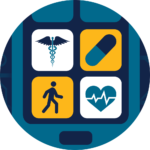
The Internet of Things (IoT) in healthcare is growing rapidly. With numerous IoT devices connected across healthcare networks, risks and threats could potentially affect people’s safety, and even have life-and-death implications. The Health Insurance Portability and Accountability Act of 1996 (HIPAA) is a federal law that requires national standards that govern patient health information, including electronic data.
Your devices may contain more health and healthcare information than you think. Do you…
| …wear a pedometer and/or sleep monitor on your wrist? …have emails from your doctor on your phone? …check your medical portal from your phone? …have health apps that monitor depression or chronic pain? …store your health-insurance passwords on your devices? …google or search health websites to check symptoms? …trace contacts for COVID-19 or other diseases on the internet? …wear any web-based or Bluetooth-enabled medical monitors such blood-sugar or heart monitors or a CPAP machine? |
If you answered yes to any of these questions, some simple steps can help you protect the most private data you have.
 |
READ the privacy statements of your healthcare providers. Do not consent if you do not understand or agree with the terms. For more information, call your providers’ HIPAA compliance officers to discuss how your health data are protected. | |
| Log off every time you log into a heath or healthcare website. | ||
| Secure your mobile devices (See Cyber Security Best Practices To-do List) | ||
| Connect only to password-protected internet connections. |